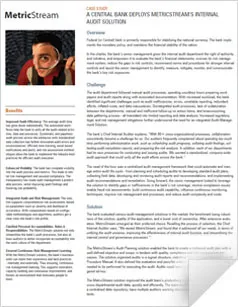
AI-First Connected GRC
Drive a Connected GRC Program for Improved Agility, Performance, and Resilience
Discover Connected GRC Solutions for Enterprise and Operational Resilience
Explore What Makes MetricStream the Right Choice for Our Customers
Discover How Our Collaborative Partnerships Drive Innovation and Success
- Want to become a Partner?
Your Insight Hub for Simpler, Smarter, Connected GRC
Effective Governance through Internal Auditing
Overview
Internal Audit supports the Board of Directors (BoD) and its committees by independently assessing the effectiveness of an organization’s system of internal controls as well as compliance with statutory, legal and regulatory requirements. Given the importance the BoD attaches to this role, organizations are making every effort to adopt Internal Audit across the enterprise for better management of risk and effective compliance with regulation.

There is a widespread call for greater board (BoD) accountability and transparency - the twin key issues that engage boards are - What are the risks? and How are they managed? An Internal Audit function addresses both concerns. Internal Audit supports the BoD and its committees by independently assessing the effectiveness of an organization’s system of internal controls as well as compliance with statutory, legal and regulatory requirements. Given the importance the BoD attaches to this role, organizations are making every effort to adopt Internal Audit across the enterprise for better management of risk and effective compliance with regulation.
As Internal Audit adopts new roles - provide assurance and establish trust through assessment of design, implementation, and application of internal controls across all disciplines - organizations are looking for ways to make the Internal Audit function an integral part of governance and an instrument to improve business performance.
Developing A Strategy
The first step is developing a specific audit strategy that is capable of addressing key organizational and emerging risks. A good strategy will take into consideration the changing nature of the business and the evolving challenges of the global marketplace and also ensure its alignment with corporate goals and objectives. Consequently, the strategy will lead to an audit plan that will be based on best practices and have a focus on fostering a healthy environment for continuous improvement.
Executing the Plan
A consultative approach with participation from all levels throughout the business can be instrumental to executing the audit plan. The success essentially depends upon targeting audits at the right level in the organization with adequate support. Some organizations are developing innovative assessment methodologies with a focus to enhance and strengthen control at minimal incremental cost.
Measure of Improvement
The execution ends with a set of recommendations that address issues in terms of causes, conditions, and impact/ action plan. Emphasis should be on changing the perspective of management from placing blame to supporting actions. Certain organizations have gone ahead and renamed recommendation to “measure of improvement”. The challenge essentially lies in promoting better understanding of the issues and in creating shared responsibility with the business group. The Internal Audit function should also seek new ways to reach out and help senior leadership create greater accountability and awareness through training, consulting and reporting.
Setting the Right Tone
The Internal Audit function should set very high standards for audit strategy, execution, and reporting for setting the right tone in the organization. Executive management and Business unit managers should be involved throughout the process ensuring that everyone agrees with the final report and that it fairly represents the current state of the organization. This will also serve in maintaining Internal Audit’s reputation in the organization.
From this perspective, the board should ensure appropriate positioning of the Internal Audit function within the organization. Internal audit should also proactively market internally their core business which includes key risks and control environment with an eye on governance obligations and compliance. Additionally, the board should also be supportive of innovative shifts in the audit approach.
The Internal Audit function should aim to be fully integrated in the business, adding value by supporting the strategic objectives of the board. A well performing Internal Audit function is critical not only for effective governance but also for competitive advantage in today’s marketplace.

Subscribe for Latest Updates
Subscribe Now





